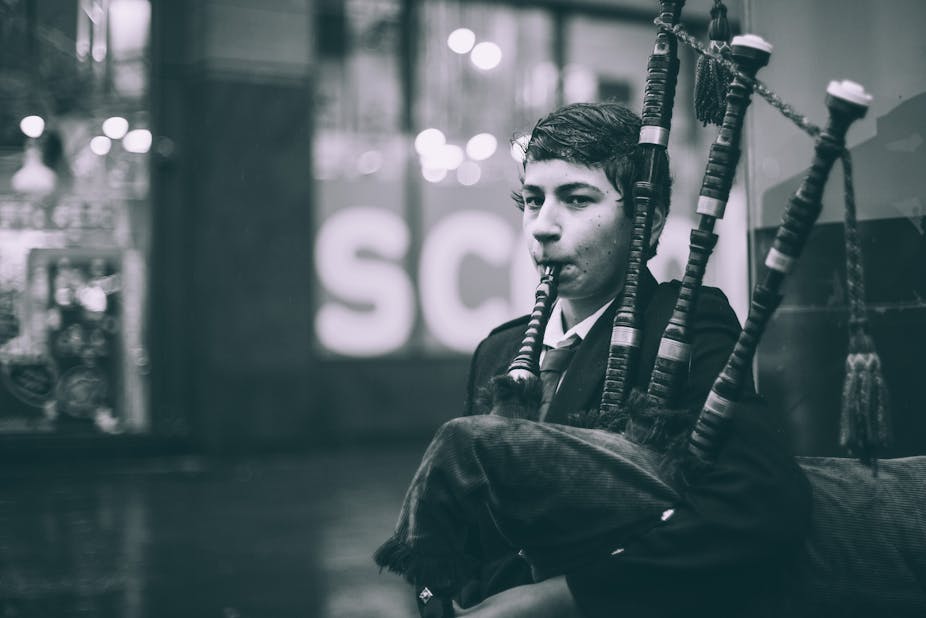The city of Glasgow has a very distinctive dialect and accent. Its famous incomprehensibility has even been demonstrated in a lab experiment, and is seemingly consistent over time. The glottal stop, where “t” sounds get dropped, was common currency well before the 20th century, as can be seen from these observations by a visitor to the city written in 1892:
Strangers hurl at us a sort of shibboleth such sentences as ‘pass the wa’er bo’’le, Mr Pa’erson’.
What we didn’t know until now was how it had changed over time. We knew that across the UK, there has been much levelling out in the way we speak during the 20th century. Linguists have linked this with the unusually large population movement during World War II and the post-war years of urban regeneration, which increased opportunities for different dialects to come into contact with one another.

The local features of traditional regional dialects have consequently been worn away, while characteristics from elsewhere have spread – particularly a set of consonant sounds usually associated with London, such as using “f” for “th” in words like “think” and “tooth”. This has prompted speculation that by 2030, we might see less diversity of accents in England. Even the Queen’s vowels have been observed to have subtly changed in the same general direction.
So what about Glasgow? We knew that consonant trends like switching the “f” for “th” had reached Glasgow as early as the late 1950s and had taken off in the 1990s, at least partly because of the influence of TV. But we didn’t know what might be happening to other aspects of Glasgow’s accent. We predicted that they might have been stable, or if they were changing, they would have been following trends south of the border, since the people had lived through similar intense population movement.
At the University of Glasgow in 2011, we sought to investigate this by setting up the Sounds of the City project, studying the recordings of more than 140 Glaswegians speaking from the 1970s to the 2000s, including older, middle-aged and adolescent speakers. This allowed us to track linguistic change by comparing speakers in different periods. It also meant we could look at the Glasgow accent across the 20th century, since speakers tend to acquire their language as children and then speak the same way throughout their lives. This means that listening to the speech of a 70-year-old gives us a window into speech in their community 60 years earlier.
We also had a lucky break. In 2013 we came across some rare early dialect recordings now held by the British Library. Wilhelm Doegen, an enterprising language teacher and sound pioneer, had travelled around prisoner of war camps in Germany in 1916-17, making short recordings from British and Commonwealth soldiers to document their dialects and languages. We took this extra opportunity to observe dialect as it was spoken at the start of the 20th century, analysing short recordings from six young men from Glasgow and elsewhere in the Scottish central belt.
What we figured oot
To our surprise, our predictions about the accent were completely wrong. Almost all the aspects of speech that we analysed – vowel qualities; pronunciation of stop sounds like “p”, “t” and “k”; and pronunciation of “r” and “l” – showed evidence of change over the century. But instead of showing more signs of being affected by the spread of southern English characteristics, we instead saw local changes to the accent. For example, in Anglo-English the vowel sound in words like “boot” and “room” is getting closer to a kind of “i” sound, but in Glasgow it is becoming more open – listen to the pronunciation of “cuckoo” in the Irn Bru advert below, for instance.
Our predicted timescale for the change that happened during the 20th century was also too recent. Some changes had started before the turn of the 20th century, while others seem to have begun after World War I itself – listen to how William Bryce, a 25-year-old Glaswegian, sounded in 1916 in the recording below. You can hear how he uses lots of Scots vocabulary, but if you listen very carefully, you will also hear that he has almost no “r” sounds in some words like “father”.
We still don’t know why Glaswegian has adopted a few UK changes, but retained local features so firmly (while in some cases they have changed in their own way). We suspect it may be at least partly to do with the way that language is linked to social identity and attitudes in the city.
We are now continuing to analyse our recordings to track and discover other aspects of sound change. We have also created a small online resource with stories, quizzes, activities and information about the project, so that anyone wanting to learn about language change in Scottish English can find out more for themselves.

